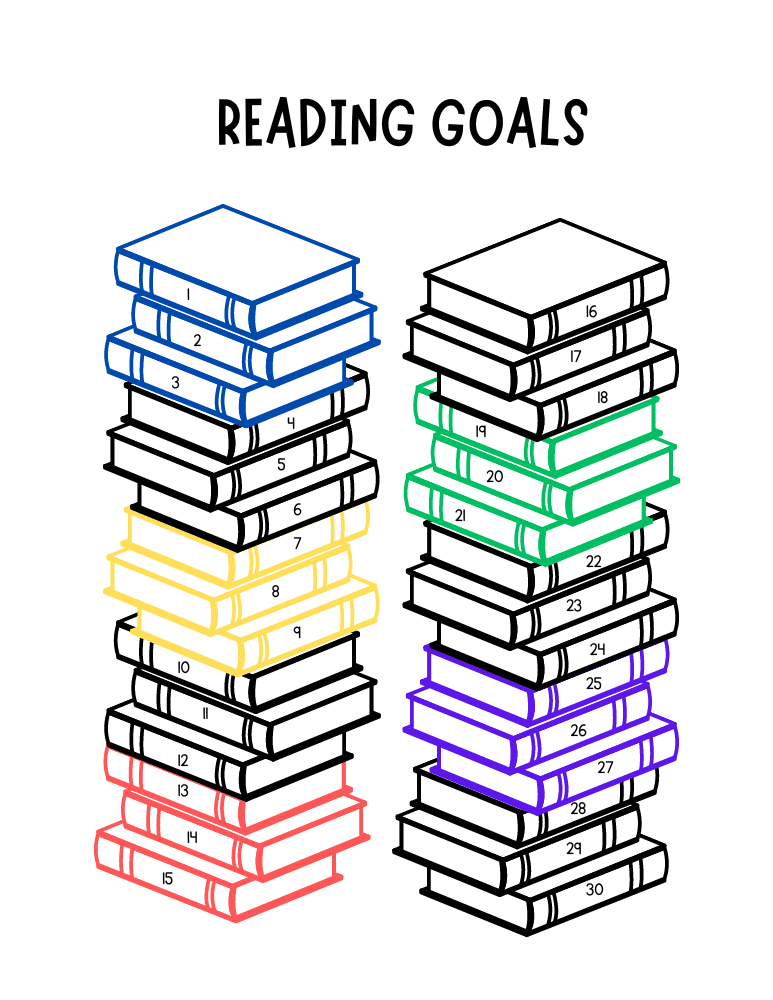Last Updated on February 22, 2024 by Christin
When reading is a habit, it is not just fun, it’s also like a superfood for your brain! With each book you can gain insights, knowledge, and empathy. Plus, it’s a great way to escape all those buzzing gadgets for a while. We all love the idea of making reading a habit, but let’s be honest – sticking to it can be tough. What’s missing? A little direction and some goals to keep us on track! When we set out clear reading goals, we turn flipping pages into a fun mission that can take our book game from ‘meh’ to ‘wow’!
In this article, we’ll explore ten reading goals that book lovers and personal growth seekers can adopt to enrich their reading life over the next year. By setting these goals, you’re not just enhancing your own life but also contributing to the wider literary community. Whether you’re a seasoned reader or just starting, these goals will challenge you, expand your horizons, and reignite your passion for the written word.

1. Read a Diverse Range of Genres
Variety is the spice of life, and the same goes for your bookshelf. Make a goal to read outside of your comfort zone and explore genres you might have never considered before.
Not only will this broaden your literary palate, but it will also expose you to different storytelling styles, worldviews, and experiences. If you tend to stick to one genre, try incorporating at least one new genre each month.
Benefits:
- Enhanced creativity and open-mindedness.
- A more nuanced understanding of the world.
Practical Tips:
- Research book lists for various genres.
- Ask for recommendations from friends with diverse reading preferences.
- Try blending genres or reading books that transcend traditional genre boundaries.
2. Set a Reading Challenge
Challenge yourself with a specific number of books you’d like to read within a year. This could be anything from 12 books (one per month) to more ambitious numbers like 50 or even 100 books. You could even turn it into a friendly competition with a fellow booklover.
Benefits:
- Increased motivation and productivity.
- A sense of accomplishment upon completion.
Establishing a Target Number:
- Start with your reading pace. How many pages can you comfortably read in a sitting?
- Decide on a number that challenges you but is also attainable.
Practical Tips:
- Track your progress with a bookshelf app or a simple spreadsheet.
- Consider scheduling dedicated reading time each day or week.
- Don’t be too hard on yourself if you don’t meet the target—adjust it if needed.
3. Join a Book Club
Reading doesn’t have to be a solitary activity. Joining or starting a book club can provide a supportive community to discuss novels, share insights, and celebrate literary achievements.
If the thought of regularly attending a book club meeting is daunting, there are online book clubs that offer the same benefits with more flexibility.
Benefits:
- It holds you accountable to finish books.
- You’ll engage in rich, multi-perspective discussions.
Practical Tips:
- Check out a place like Meetup.com for a book club near you.
- Find a club that reads varieties of genres and styles.
- Make sure you enjoy the social dynamics of the club.
- Attend regularly to ensure you contribute to the reading discussions.
4. Write A Review Of Every Book You Read
Writing reviews of books you’ve read is a great way to process and reflect on the story, characters, and themes. It also helps other readers discover new books and decide whether a particular book is worth their time.
Benefits:
- Encourages critical thinking skills.
- Helps you articulate your thoughts more clearly.
Practical Tips:
- Keep notes while reading to make writing the review easier.
- Be honest, but also constructive and respectful in your reviews.
- Share your reviews on a personal blog or a book reviewing platform to reach a wider audience.
5. Journal About Your Reading Journey
One reading goal that can make your reading even more valuable is to keep a reading journal. Keeping a journal of your readings offers the chance to reflect on what you’ve learned, jot down your favorite quotes, and even document your evolving tastes in literature.
Whether you prefer a dedicated reading journal or a digital note-taking app, make it a habit to jot down your thoughts regularly.
Benefits:
- It enriches your reading experience by deepening your engagement with the books.
- Over time, you can track your literary growth.
Practical Tips:
- Reserve a few minutes after each reading session to write a brief review or reaction.
- Use your reading journal as a tool to set or adjust your other reading goals.
- Consider sharing your reading journal with a close friend for more meaningful discussions.
6. Read More Non-Fiction
While fiction can be a wonderful escape, non-fiction can be a gateway to learning new things and seeing the world in a different light. Set a goal to read a particular number of non-fiction books, or challenge yourself to read about topics you typically shy away from.
Benefits:
- Continual learning and acquisition of new knowledge.
- A deeper understanding of culture, history, and current events.
Practical Tips:
- Start with subjects you’re already interested in.
- Ask for recommendations from experts or enthusiasts.
- Combine non-fiction with fiction by exploring books that offer factual context to the novels you’re reading.
7. Support Local Bookstores
Amid the seismic shifts in the publishing industry, independent bookstores are often the first casualties. Make it a personal goal to support these vital community institutions by patronizing them over the convenience of online retailers or big chains.
Why It’s Important:
- They provide critical spaces for community building and cultural enrichment.
- They often curate titles and provide recommendations that you won’t find in larger stores.
Practical Goals:
- Choose a specific number of books you’ll purchase from local bookstores.
- Attend readings, signings, and other in-store events.
- If your local bookstore doesn’t have what you’re looking for, ask them to order it for you.
8. Align Your Reading Goals With Other Areas Of Your Life
Make your reading goals work for you in other aspects of your life. If you’re learning a new skill or pursuing an interest, set a reading goal that complements this. For example, if you’re trying to improve your writing, aim to read a certain number of classic novels known for their literary style and craft.
How to Align Goals:
- Regularly review your overall life goals and find ways that reading can enhance them.
- Choose books that will directly add value to your other life goals.
Practical Tips:
- Ensure the books you choose are relevant and well-regarded in their field.
- Take notes on how the books you read can be applied to your other goals.
- Share your reading goals with friends and mentors for additional support and ideas.
9. Volunteer for a Literary Cause
Put your passion for reading into action by volunteering with a literacy program, a book festival, or a writing workshop. Not only will you be contributing to your community, but you’ll also be surrounding yourself with like-minded individuals who share your love for reading.
Benefits:
- A sense of purpose and contribution to a cause you care about.
- Networking opportunities with professionals in the literary field.
Practical Tips:
- Research the various ways you can volunteer in your area.
- Prepare to offer your skills, whether it’s through organizing events, mentoring new readers, or marketing initiatives.
- Remember to enjoy the experience and the connections you’ll make.
10. Set Personal Growth Milestones Through Reading
Lastly, use your reading goals as a tool for personal growth. Whether it’s enhancing your empathy through character-driven fiction or learning about philosophy to improve your decision-making skills, ensure that each book you read contributes to your holistic development as a person.
What to Consider:
- Which areas of personal growth do you want to focus on?
- Which books can help you in these areas?
Practical Tips:
- Set clear milestones for your personal growth.
- Make a reading list of books that align with these milestones.
- Reflect on your personal growth at regular intervals and adjust your reading list as necessary.
Each of these reading goals offers a unique path to self-improvement and enrichment. As you begin to set and achieve these milestones, you’ll discover that the act of reading is not just a pastime but a powerful means to better yourself and your world. Happy reading, and may the next year be filled with many great books that shape your life in ways you never thought possible.





